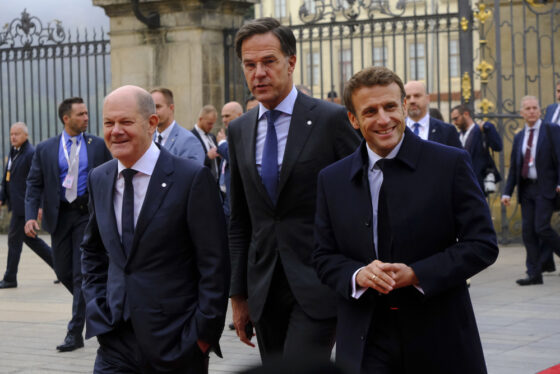Dutch-German meeting highlights Rutte’s role as power broker


German chancellor Olaf Scholz is heading an eight-strong government delegation to Rotterdam to discuss co-operation on a range of issues, from support for Ukraine to improving cross-border rail connections.
The scheduled meeting, which takes place every three years, comes at a moment when the Netherlands is reasserting itself as a European power broker, following the departure of Scholz’s predecessor Angela Merkel.
While Franco-German relations have been strained in the last year, prime minister Mark Rutte has cultivated strong relationships with both the German chancellor and French president Emannuel Macron, symbolised by Macron’s recent visit to an Indonesian restaurant in The Hague.
‘It helps that since Merkel’s departure, Rutte is the most senior statesman on the European stage,’ Tom Nijhuis, director of the Germany Institute Amsterdam, told the NRC.
The governments will aim to synchronise their policies on interest rates, which are controlled by the European Central Bank on Frankfurt, green energy – where Germany’s car industry is pressing for an exemption for petrol and diesel-powered cars – and doubling the rail line that connects Enschedé with Dortmund and Münster.
The meeting is also being held a few days before the 13th Light Brigade becomes the last Dutch regiment to come under the command of the German army, completing the fusion of the two countries’ military forces.
German defence minister Boris Pistorius and his Dutch counterpart Kajsa Ollongren will attend a ceremony at the headquarters of the 10th Armoured Division in Würzburg formalising the merger under a ‘common army vision’ agreed last November.
In the political arena the Netherlands has taken an increasingly hawkish stance on military support for Ukraine, in contrast to the Germans, who have been criticised for their reluctance to commit equipment such as tanks without guarantees of equivalent support from the United States.
The two countries’ culture ministers are expected to discuss the repatriation of colonial artworks, but Nijhuis said the cultural relationship has weakened in recent decades.
‘The political and economic relations between Germany and the Netherlands have never been so strong, but the reciprocal interest could be better,’ he said.’
Thank you for donating to DutchNews.nl.
We could not provide the Dutch News service, and keep it free of charge, without the generous support of our readers. Your donations allow us to report on issues you tell us matter, and provide you with a summary of the most important Dutch news each day.
Make a donation